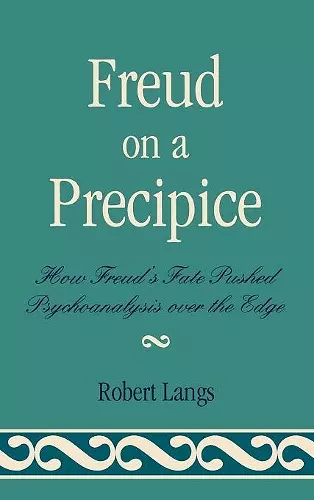Freud on a Precipice
How Freud's Fate Pushed Psychoanalysis Over the Edge
Format:Hardback
Publisher:Jason Aronson Publishers
Published:26th Oct '09
Currently unavailable, and unfortunately no date known when it will be back

This book is a psychoanalytic detective story that takes the reader back to the late 1890's and to the generally unappreciated, yet single most important, turning point in the history of psychoanalysis. The context is the death of Freud's father and the decision Freud made to abandon his first, reality-centered theory of the mind in favor of a theory focused on inner fantasies and needs. Marshalling a large body of evidence, Langs views this change of heart as a regressive paradigm shift driven by unconsciously influential archetypes that were, in turn, linked to a series of early-life traumas in Freud's life, possibly eight in all, several of them preceding Freud's birth and all but one outside of Freud's conscious awareness. The ramifications of these incidents placed Freud on a later-day precipice from which his fall into equivalents of homicide and suicide were at risk; Freud shifted focus to save his life! Langs' detective work brings him to new insights into such matters as the psychological archetypes that affect the creation and modifications of paradigms, physical and mental; a new, utilitarian view of the design of the emotion-processing mind; recognition of the complex unconscious impact of reality and of death-related traumas on the human psyche and emotionally-charged choices; the vast superiority of Freud's first paradigm over his second theory of the mind; and the unconscious reasons, despite its many flaws, that Freud's second paradigm remains in favor to this very day. Freud saved his life by shifting course, but at the same time he created a theory that must be held partly accountable for the compromised forms of dynamic therapy and broad psychological harm that has followed in its wake. Using an updated version of Freud's first paradigm, Langs shows us a better way to live and work, as a psychotherapist or any other career.
The latest thought-provoking book from the pen of Robert Langs, MD, prolific and provocative psychoanalytic author and thinker, shows us not only how Freud pushed psychoanalysis over the edge but how during a serious crisis in his life Freud stood at the edge of a precipice from which he could have easily jumped to his death. Langs gives us a brilliant analysis of how Freud’s life shaped his revolutionary theories about trauma, seduction, and the Oedipus complex. -- Zvi Lothane M.D., Author of In Defense of Schreber: Soul Murder and Psychiatry
Robert Langs honors the father of psychoanalysis, by applying Freud's original, trauma and reality based theory, to Freud's life and writings. He uncovers the unconscious forces which drove Freud's decision to abandon this first theory in favor of one based on inner needs and fantasies?a tragic but survival based decision. He points out the effects as well, which have been passed down through generations of analysts. Analysts today can make a different decision. Langs adds the Adaptive Approach, based onand extending Freud's original theory to our range of choices. This book is a departure for Langs in tone and style. The voice is graceful and the tone is sombre. It has the pace of an intriguing and meticulous detective story with a complex arc, leading to a crescendo at the finish. The author also takes an unprecedented step by inviting the reader to accompany him on a journey of discovery, rather than attempting to penetrate the reader with an irrefutable truth. Langs beckons and is curious, along the way, asking readers to listen with their unconscious minds, and then look at and perhaps share their responses with him. This is a unique, startling, and indispensable book about Freud, psychoanalysis, and the hidden truths of human life. -- Cate Nelson, MFT
Robert Langs honors the father of psychoanalysis, by applying Freud's original, trauma and reality based theory, to Freud's life and writings. He uncovers the unconscious forces which drove Freud's decision to abandon this first theory in favor of one based on inner needs and fantasies—a tragic but survival based decision. He points out the effects as well, which have been passed down through generations of analysts. Analysts today can make a different decision. Langs adds the Adaptive Approach, based on and extending Freud's original theory to our range of choices.
This book is a departure for Langs in tone and style. The voice is graceful and the tone is sombre. It has the pace of an intriguing and meticulous detective story with a complex arc, leading to a crescendo at the finish. The author also takes an unprecedented step by inviting the reader to accompany him on a journey of discovery, rather than attempting to penetrate the reader with an irrefutable truth. Langs beckons and is curious, along the way, asking readers to listen with their unconscious minds, and then look at and perhaps share their responses with him.
This is a unique, startling, and indispensable book about Freud, psychoanalysis, and the hidden truths of human life.
ISBN: 9780765706003
Dimensions: 241mm x 161mm x 19mm
Weight: 431g
180 pages